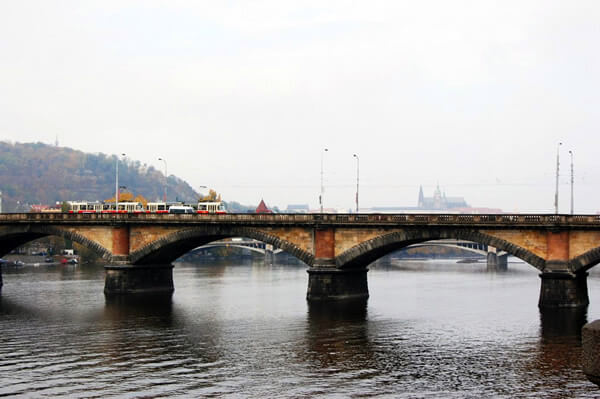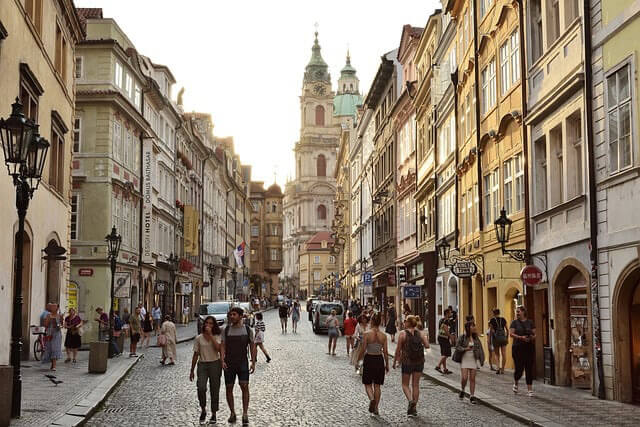Studying Abroad and Living in Prague, Czech Republic
Land of the “Unbearable Lightness of Being”
by Tanya Xu

|
|
Tram crossing a bridge in a foggy Prague. Photo by Tanya Xu.
|
Why Study in Prague?
I will be honest: many students study in Prague because the beer is world-famous and food and transportation is cheap. And yes, it’s true: their beer is good (especially the Pilsner brand), their food is cheap (groceries cost around $50 per week), and public transportation is also affordable (you can hop on a train to anywhere in the Czech Republic for less than the price of a movie ticket).
I chose to study in Prague for a slightly different reason: The Czech author Milan Kundera changed my life. I wanted to see the political, geographical, and cultural conditions that inspired Kundera’s novel — and my literary Bible — The Unbearable Lightness of Being, which is set in this region. After living in Prague for a semester, I understand why this novel works and could only work here.
On the surface, Prague is a small, romantic, cobble-stoned, red-roofed city, organized along a river and crossed by many bridges. Underneath, Prague is growing, a little unsteady on its new democratic feet, and still coping with the hangover from Communism.
And that speaks to how many might see the Czech Republic in general. In the past, it was a culturally rich and central crossroad connecting Western and Eastern Europe, sometimes getting swept up in the intersection of much larger empires. Today, it is a modest but lively and still culturally rich nation in Central Europe, trying and beginning to catch up with many of the European economic giants that surround it (as the 13th largest economy in the EU). Czech students were always surprised why I would want to come here (“Why would you choose to study here?” was a frequent question), but it is also for that very reason that I think it is important to experience life in a smaller, less well-known country such as the Czech Republic.
Studying in the Czech Republic allowed me to see how living in a small country differs from being a world superpower. And the Czech Republic’s political and geographical “smallness,” compared to the US, affects more aspects of human life than I would have thought: the culture, people’s attitude, the nation’s ambitions… it helps shape a nation’s entire character.
Ultimately, understanding both sides of the power balance is invaluable for understanding international relations and different cultures, and this was one of the most valuable lessons I took away from studying and living in the Czech Republic.

|
|
Older man walking his dog across the famous Charles Bridge in Prague.
|
Preparing for Prague
Regarding what is often called "culture shock," if you have lived in a Western culture before, you only need to prepare a little outside of packing. I was even slightly disappointed at how easy it was to adjust to life in Prague. They enjoy many of the same music, movies, and Western values as Americans.
Consequently, Prague may be a good place to study abroad for the following reasons:
-
You have not been out of the country before or seek an easier cultural adjustment.
-
You want to do something other than the typical Western European abroad experience.
-
You still want to live in an English-speaking city. Many people speak English in the street, so knowing Czech is unnecessary, though learning as much as possible is recommended and appreciated as a sign of respect.
On the other hand, it is also easy for students studying here to remain in a “Westernized bubble.” Significant differences exist between Czech and American life, but you must be more proactive in exploring and being open to the unique local culture.
Choosing a Program in Prague
Most colleges approve two popular programs: CIEE in Prague and NYU in Prague.
I chose CIEE primarily for monetary reasons (tuition, room, and board were about US$13,500 per semester when I attended). On top of this, I would set aside an additional US$1,000 for a round-trip plane ticket and US$2,000-US$3,000 for personal expenses, food, and travel.
CIEE Prague is a comprehensive and well-organized program. They give you a thorough orientation, going over everything from staying safe to reading tram schedules. They also give you some money back (“cultural reimbursement”) for doing cultural activities alone. They also loan out a Czech cell phone for the semester. They have a full-time office, and the staff there is also accommodating. Well-qualified teachers hired by CIEE teach the classes. You take classes with the other students in the program.
The program offers three types of housing: a dorm room, an apartment, and a homestay. I would suggest an apartment or a homestay for a more authentic cultural immersion experience and to escape the “American bubble.” I lived in an apartment because you also get to live with a Czech university student, which is extremely helpful if you want answers to your questions, and it is an excellent way to meet the Czech people. The apartments are all outstanding and in attractive locations.
Keep in mind that both the CIEE and NYU programs basically “hold your hand” throughout your whole time abroad. If you want a more independent experience, I would apply directly to Charles University through the CEECE (Central Eastern European Cultural Exchange) program. You will be “enrolled” in the University, but you can still take classes there in English alongside other international students.
Making the Most of your Budget
Prague is a huge tourist destination, of course. For many tourists, Prague is the beautiful, archetypal European city they want to “do” in a day and then move on.
For this reason, restaurants and shops in the city center can be rather pricey. They are usually less expensive than the US but may be nearly equivalent. One meal can cost you $15-25 in the city, depending on how many courses you order. Unless you find some less touristy locales for food, I suggest cooking for yourself rather than going out to eat. There is a huge grocery chain called TESCO and smaller, locally-owned grocery stores (potraviny), which you can find on almost every street corner, and groceries are generally very cheap. If you visit other regions in the Czech Republic, you will also find that prices are significantly lower.
Going to pubs is also a large (and important) part of Czech culture. Czechs often like to sit in pubs for hours as a social pastime, to smoke and chat with friends. Therefore, pubs are an excellent place to meet Czechs as well. As a general rule of thumb, while in Prague, you should not usually have to pay over US$2.50 for a domestic beer.
The public transportation is both frequent and efficient. The city metro trains and trams will take you anywhere you want to go in Prague. dpp.cz is the website that gives you a schedule of the intervals they arrive — a handy way to find your destination. In particular, tram 22 goes to many essential stops and crosses much of the city; hopping on it just for the scenic ride might be valuable. Buying a pass at any metro station will be valid for any public transportation. Make sure to always bring it with you, though; the Czechs operate on an “honor system” where anyone can hop on, but there are plainclothes men who sometimes randomly check for your passes. At first, we mistook them for beggars — often, a man riding on the metro would extend his hand to me without a word, uniform, or badge! Such behavior was pretty characteristic of the Czechs: people tend to keep formalities to a minimum while assuming you understand the implicit rules.
I would not underestimate the benefit of walking, either. The advantage of Prague is that it is a small city. It is valuable to see how different regions connect, and it also only takes about 90 minutes to traverse the entire city center on foot.
The cheapest way to keep in touch is to buy a used or second-hand cell phone once you get there (unless you have access to WiFi and software such as WhatsApp and Zoom with a smartphone). But with a second-hand cell phone you can purchase prepaid minutes at almost any gas station or convenience shop (tabak). Some of the few remaining internet cafes are reasonably priced.
The best way to access money is to withdraw it from an ATM once you get there (there is usually one in every metro stop). It is easiest to pay with cash and nearly impossible to pay via check. You should note that the Czech koruna (also called a crown) does not use the equivalent of “cents” anymore, only “bills.” If you are checking out at a cash register, the display will still show a number with decimals, but you need to pay the amount rounded to the nearest number of crowns.

|
|
A street scene in Prague.
|
Living in Prague: Cultural Immersion
Many say Prague feels “Americanized” and is like living in any other Western city. Like any rumor, I found this to be both true and untrue. It is probably true that you will not have a hard time getting used to life here compared to studying abroad on another continent. But it is also untrue that there are no differences between Czech and American culture. I would say that the differences are more subtle, and you have to look deeper to discover them. For example, these are some of the things I learned:
Lasting influences of Communism: I was a little put off at first because people on the streets seemed ruder than I was used to. You will especially notice this in stores because the customer may always be right in America, but the cashier is undoubtedly correct here. When I tried to pay for some cakes with the approximate equivalent of a $100 bill, the shop owner became huffy, and I was quickly steered out the door. Small shops often would rather not have your business than give you the correct change. Customer service also tends to be limited. But this is primarily due to the many decades the Czech Republic spent under Soviet Communism; shop owners were rarely friendly because smiling at customers did not get them more money. So it was ingrained in the culture, a trace of history, though it is now changing. Perhaps more damaging and lasting is the shaky political structure currently in place. Even though the Czech Republic is now a liberal democracy, the long period it spent under Communism promoted an inescapable habit of corruption (because often, corruption was the only way to get something done). The behavior is the result of people having minimal trust in politicians. When I was there, a scandal erupted when it was discovered that some politicians had purchased their law degrees from a private university. But when I talked to Czech people, they just laughed it off because that is what they expect from politics. The social situation raises the interesting question: how can a liberal democratic nation be developed without trust or transparency in its democracy?
Czech Identity: Some famous Czechs have also noted the country’s “identity crisis.” Sometimes, visitors have difficulty defining Czech culture because the Czech Republic has continuously been influenced by its neighbors throughout its history and has adopted many German, Russian, and Austrian characteristics. Also, as a country with just 10 million people, it has fewer votes in the EU and a smaller voice on the world stage. In literature (for example), there are only two widely-read Czech authors: Franz Kafka and Milan Kundera. But between these two literary giants, there is a large void. It will be interesting to see how authors will fill it in the future.
Overall, my experience abroad was refreshing and gave me a much broader perception, not only about the Czech Republic but about the ways in which the US (as a more prominent “superpower”) is different and is perceived as such by the rest of the world. Sometimes, you must step away from the world you usually live in to get a good look at it.
Tanya Xu has lived in Boulder, Colorado, for many years, but her family’s most fundamental experiences in this country remain those from the years they lived as immigrants. As a result, she has always been interested in traveling and learning about other cultures. Tanya went to Prague to study the internationally acclaimed Czech author Milan Kundera. She sees literature as a valuable inlet to cultural truths and one of the most personal ways people can give order to human existence. She is currently an English literature and chemistry double major at Amherst College.
|
